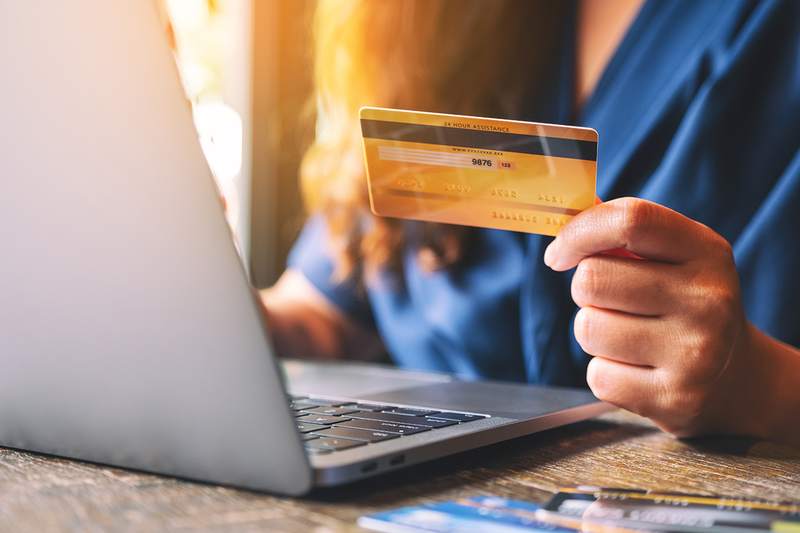Unexpected expenses are a fact of life. If you’re living paycheck to paycheck or struggling to build credit, the need to borrow even a few hundred dollars may rule out a traditional loan. While loans with no credit check offer the benefit of quick cash, they usually come with hefty fees and high interest rates, which can pose a long-term risk to your finances. It’s important to understand the good, the bad and the ugly truth behind no-credit-check loans before you take one on.
Key takeaways:
- No-credit-check loans allow those with poor credit or a short credit history to get the cash they need fast.
- No-credit-check loans include payday loans, car title loans, installment loans, cash advance loans and buy now, pay later options.
- Some loans that don’t require credit checks also have incredibly high interest rates: up to 300% and even beyond. Always research a loan’s terms and the interest rates before signing on the dotted line.
No-Credit-Check Loans, Explained
No-credit-check loans are personal loans from a lender that won’t check your credit. This can help you get the loan even with a lower credit score and protect your score from taking a hit due to a hard credit check. If you have bad credit, no credit history or want to avoid the risk of lowering your credit score, personal loans without credit checks might be a viable choice.
However, no-credit-check loans come with downsides. For instance, you typically can borrow only small amounts of cash. No-credit-check lenders may also charge exorbitant interest rates and fees – so high that if you fail to pay them off quickly (often within weeks), interest can accrue at annual percentage rates (APRs) of up to 300% or 400%.
Like traditional loans, no-credit-check loans can be secured or unsecured. Secured loans require you to put up collateral, like a car, that the lender can seize if you default on the loan. For this reason, secured loans can be extra risky for borrowers. On the other hand, unsecured loans don’t require collateral, but they typically come with higher interest rates and fees as a result.
Get A Personal Loan Today
Find a lender that can help you find the right loan terms for your financial situation
Types Of No-Credit-Check Loans
There are several options when it comes to no-credit-check loans:
Payday Loans
The way payday loans work varies depending on state law, but, in general, these are short-term loans for a small amount, typically $500 or less. These loans are given against your paycheck and are usually due on your next payday, within two to four weeks. You can get a payday loan at storefront locations or from online lenders, and they typically come with very high fees or interest rates.
Many states cap the fees on these loans to between $15 and $30 per $100 borrowed. That may sound reasonable, but according to the Consumer Financial Protection Bureau, a typical two-week payday loan with a $15 per $100 fee equates to an APR of almost 400%.
The legality of payday loans varies by state, as do caps on interest rates. For example, some states, like Arizona, cap short-term loan rates at 36% or less. This essentially prohibits predatory rates characteristic of payday loans. In states where payday loans are legal, average rates vary widely, from 163% in Minnesota to 652% in Idaho.
Car Title Loans
Car title loans use your vehicle as collateral. These short-term loans also come with high interest rates or fees, but you usually can borrow more than you can with a payday loan.
A title loan works like this: You give your vehicle’s title to the lender, which will approve a loan based on its value. “Car title loans can offer larger amounts, sometimes up to 50% of the car’s value, which could range from a few hundred to several thousand dollars,” says Jon Morgan, CEO and editor-in-chief of the consulting firm Venture Smarter, based in San Francisco.
There are important things to know about title loans. First, the term is typically short, such as 30 days. Second, the cost is high. “Car title loans can have interest rates around 25% per month, which can easily add up to an APR of 300% or more,” Morgan says. That means that if you borrow $1,000, after only 30 days, you will owe the lender $1,250. If you can’t pay the loan off, the lender could roll over the loan, which means more expensive interest. The lender also has the right to repossess your vehicle, Morgan says.
Like payday loans, title loans aren’t legal in every state – 25 states, plus the District of Columbia, ban these loans. In states where title loans are present, the structure of these loans can differ. Some states offer installment loans, where you repay the loan in a series of payments. Others offer lump-sum loans, which you repay in a single balloon payment.
Installment Loans
An installment loan is a personal loan you pay back in regularly scheduled installments. These loans can be for a few hundred to several thousand dollars and vary in interest rates and fees. These loans usually require a hard credit check, meaning credit bureaus will see the inquiry.
If you find a no-credit-check installment loan, it typically comes with other requirements, such as proof of income, in the form of pay stubs or bank account statements, and a valid Social Security number. You also may be able to get an installment loan with poor credit, since lenders typically consider factors other than your credit score and credit history.
Cash Advances
A cash advance is a short-term cash loan from your credit card issuers. While you usually can charge purchases or services to your credit card, you also can withdraw cash. The amount you borrow is added to your card balance and will accrue interest until you repay it.
The APR on cash advances is usually higher than that for purchases, and you may also have to pay a cash advance fee. However, the process is quick because you’re getting the cash from a credit card you’ve already been approved for. You can usually access a cash advance through an ATM, at the bank issuing your credit card, through an online app or by using convenience checks provided by your card issuer.
Buy Now, Pay Later Loans
Buy now, pay later loans are installment loans, but not in the traditional sense. Retailers may offer these loans to allow you to pay for a more expensive item in monthly installments. There’s rarely a credit check, and the retailers typically don’t charge a fee or interest, making these loans an attractive alternative to breaking out your credit card. Sounds good, right?
Maybe. These arrangements come with risks. For instance, if you are late or miss a payment, there’s often a fee. Also, these loans are typically offered by third-party companies, so a breach of your personal or financial information is a risk. Finally, since there is often little or no money needed at purchase time, making a financially sound decision based on affordability can be challenging.
Not Sure What Loan Product Is Right For You?
Answer a few simple questions to compare Refinance, Home Equity and Personal Loan offers
Pros And Cons Of No-Credit-Check Loans
Before applying for loans without credit checks, you should know their benefits and drawbacks.
One major advantage of a no-credit-check loan is the fact that because these lenders typically don’t report to credit bureaus. This means you don’t need good credit or a lengthy credit history to access cash. And since these loans can be so easy to qualify for, funds are typically accessible in a short period of time.
On the other hand, no-credit-check loans that end up in default may be reported to credit lenders, and this can have a serious negative impact on your credit. Not to mention that the accessibility of these loans comes at a high cost in terms of fees and interest rates, making it difficult or even impossible to repay your loan. To illustrate this point, one in five car title loans results in repossession.
If you’re considering a no-credit-check loan, make sure you understand the loan’s APR and how much you’ll have to pay. For example, say you take out a payday loan for $100 with a $10 fee. If your payment is due after 14 days, you’re essentially paying an APR equivalent to about 260%. Meanwhile, a credit card – which is generally considered a high-interest loan – may charge you around 20% APR.
Looking For Access To Money?
Just answer a few simple questions and we’ll help you find the funds you need.
No-Credit-Check Loans Pros And Cons
| Pros | Cons |
|---|---|
| Available to those with no or bad credit | Interest rates and fees can be very high. |
| Funds are accessible very fast | Failing to repay a title loan could result in your vehicle being repossessed. |
| They’re easy to qualify for | Because of their short terms and high interest, they could trap you in a debt cycle. |
How To Get A Personal Loan With No Credit Check
If you decide to pursue a no-credit-check loan, here are some steps to take.
Figure Out How Much You Need
Take time to determine precisely how much you need to borrow, and stick to it. For example, if you need a loan to pay for a car repair, get a quote from the mechanic before applying for the loan. Borrowing more than you need or can afford can end up costing you a lot in interest.
Check Your Credit Score
Although you’re planning to apply for a no-credit-check loan, you should still check your credit score. This is because, even if your credit score isn’t in the good or excellent range, you might be able to qualify for a loan with a lower interest rate and better terms.
You can also review your credit reports at annualcreditreport.com or through the individual credit bureaus. This gives you a chance to catch any errors, which could potentially hurt your credit score and make it more difficult to qualify for a loan.
Research Lenders And Compare Loans
Competition is your friend, so shop around for the lowest fees, lowest interest rates and best terms. It could save you a lot of money.
Based on the loans and rates you find, use an online calculator to help you estimate your loan payment – that is, how much you’ll pay in total for the loan. Many no-credit-check loans require a single lump-sum payment, while others may let you pay in monthly installments. Understanding how much you’ll owe – and when – helps you know how much of a loan you can afford.
Apply For A Loan
When you know how much you need to borrow and have chosen a lender, it’s time to apply. Because there’s no credit check, this is often a quick process, but you will need some paperwork. You’ll typically need a bank account, proof of income and ID, and you must be at least 18 years old. If you are applying for a title loan, you also will need to own your vehicle and provide a valid title, registration and extra keys.
Before signing a loan agreement, read the loan terms and conditions and ask the lender any lingering questions.
Repay The Loan
With most short-term no-credit-check loans, you will have one lump sum due on an agreed-upon date. This will include the amount you borrowed, plus the interest or fee. For instance, if you borrowed $500 with a fee of $15 per $100, you’ll have to pay the lender $575.
Where To Get No-Credit-Check Loans
There are plenty of options for finding no-credit-check loans from storefront and online lenders. In recent years, apps and online lenders have provided some less expensive options.
Online Services Offering No-Credit-Check Payday Loans
| App | Max Amount Available | Fee | Term For Repayment |
|---|---|---|---|
| Earnin | $750 | Optional tip up to $5.99 for expedited transfers | Your next payday |
| Brigit | $50 – $250 | A flat fee of $8.99 to $14.99 per month | Your next payday |
| Payactiv | Up to $1,500 | Fee of up to $3.99 | Your next payday |
Alternatives To No-Credit-Check Loans
If you have poor or no credit and need a loan, alternatives to no-credit-check loans might be a better option.
“If [you’re] unable to keep up with payments on no-credit-check loans, borrowers can face skyrocketing debt, damaged credit scores and even the loss of their vehicle, in the case of car title loans,” says Jonathan Feniak, an attorney in San Juan, Puerto Rico, and current general counsel at LLC Attorney. “Considering alternatives like payday alternative loans, peer-to-peer loans and credit card cash advances may provide more flexibility and lower interest rates.”
Payday Alternative Loan
If you’re a credit union member, ask if you qualify for a payday alternative loan. These typically come with lower interest rates than a payday loan from an independent lender. For instance, the APR on payday alternative loans is capped at 28%. The credit union also may give you up to 12 months to repay the loan.
Get A Co-Signer
If you know someone with good credit who will co-sign a personal loan for you, you could get a lower interest rate and better terms while saving money. However, there are risks, especially for the co-signer, who essentially promises to make the loan payments if you can’t. Both you and the co-signer should be confident that you can repay the loan on time.
Peer-To-Peer Loan
Peer-to-peer loans work by allowing you to borrow money straight from an investor, avoiding a bank, credit union or other traditional lender. This can be a family member, an investor or someone found through a P2P website. You’ll likely have to submit your credit score. There also are fees and interest rates.
401(k) Loan
If you have been participating in a retirement savings plan through your work, you may be able to get a 401(k) loan. You usually will have up to five years to pay it back. Not all plans offer this, and if you lose your job, you might have to repay the loan quickly.
Life Insurance Policy Loans
If you have a life insurance policy, you may be able to borrow against it. But you can only borrow against policies that include cash value, like whole life policies.
When you take a loan against your life insurance policy, you can borrow against the death benefit, or the money paid to your beneficiary after you pass. Even though you’re borrowing against your own policy, your life insurance company will still charge you interest on this loan. This option has other risks, too: If you don’t repay the loan, your beneficiary won’t receive the entire benefit. Plus, falling behind on your loan payments can lead to losing your life insurance coverage.
The Bottom Line About No Credit Check Loans
No-credit-check loans can be a convenient way to access money for an emergency, but they should be used as a last resort. These loans typically have extremely high interest rates and fees, making them expensive and risky. Because of their high cost and the severe consequences of defaulting, you should fully explore your alternatives before signing on the dotted line.

Ben Shapiro
Ben Shapiro is an award-winning financial analyst with nearly a decade of experience working in corporate finance in big banks, small-to-medium-size businesses, and mortgage finance. His expertise includes strategic application of macroeconomic analysis, financial data analysis, financial forecasting and strategic scenario planning. For the past four years, he has focused on the mortgage industry, applying economics to forecasting and strategic decision-making at Quicken Loans. Ben earned a bachelor’s degree in business with a minor in economics from California State University, Northridge, graduating cum laude and with honors. He also served as an officer in an allied military for five years, responsible for the welfare of 300 soldiers and eight direct reports before age 25.












